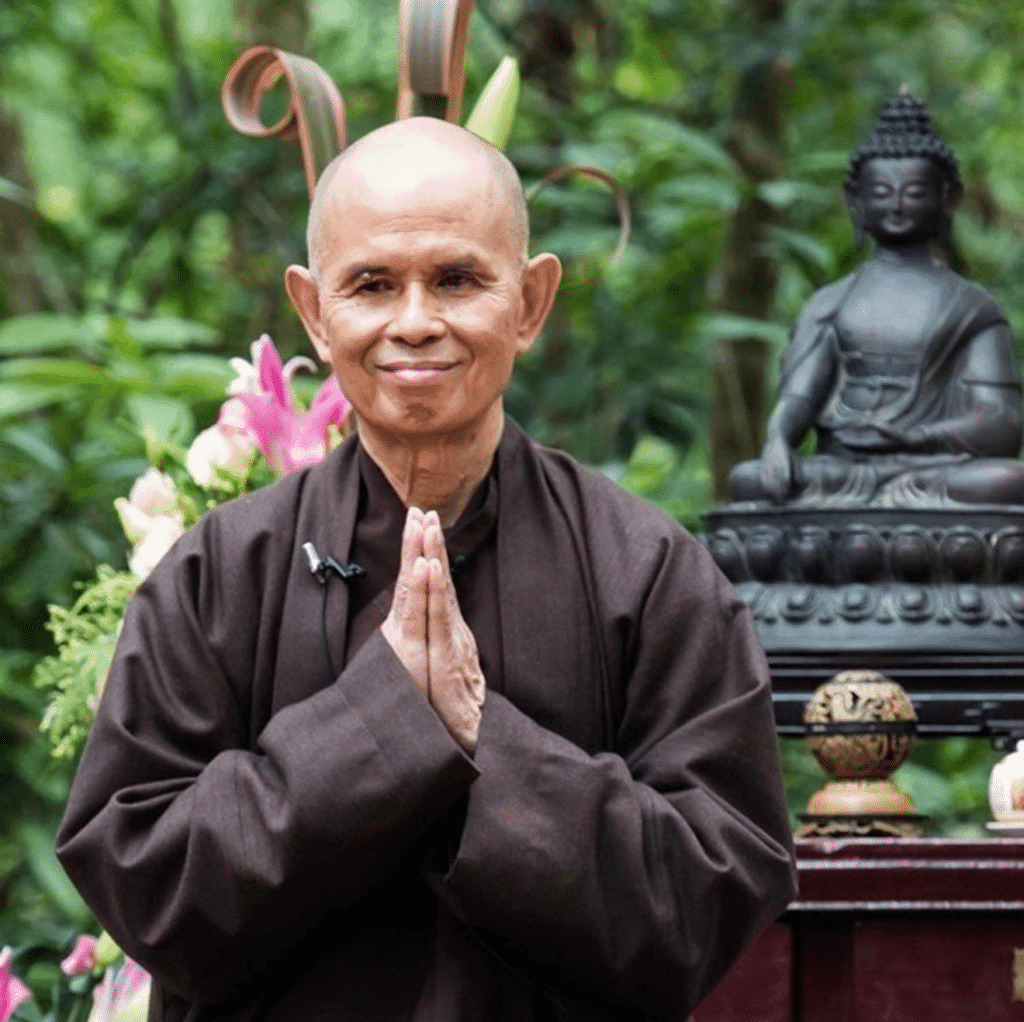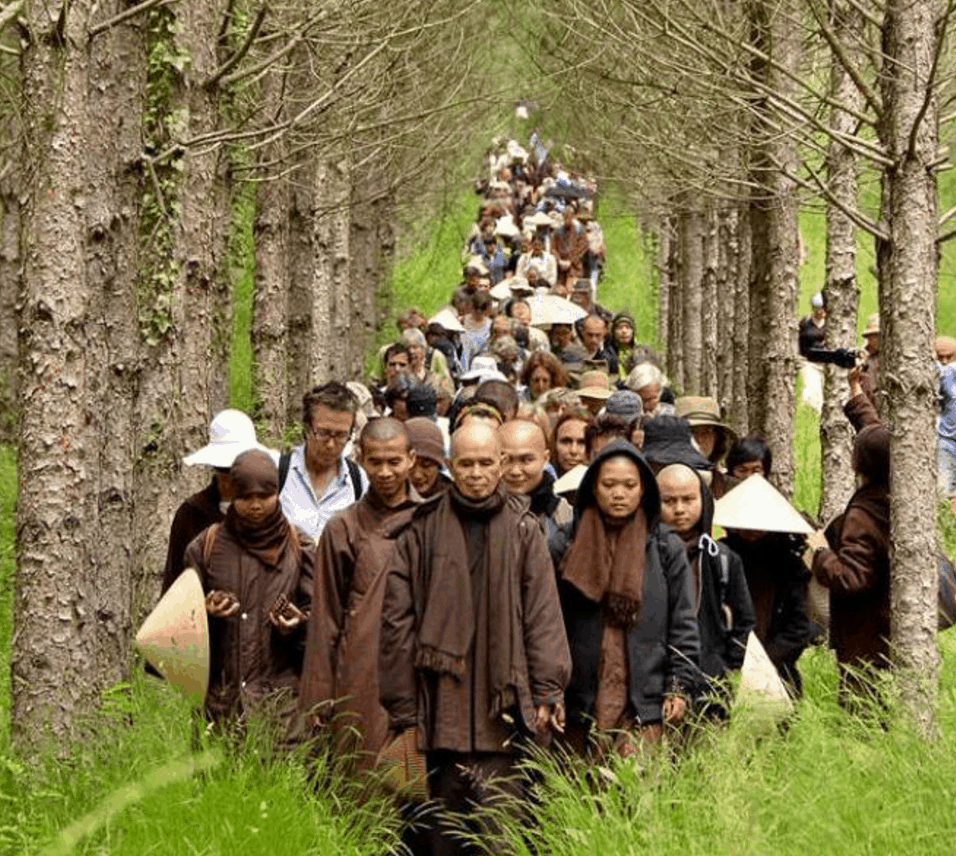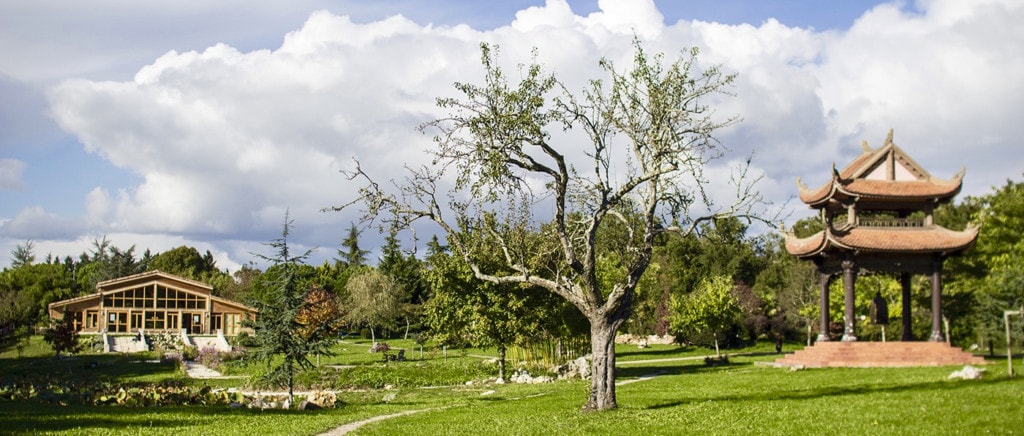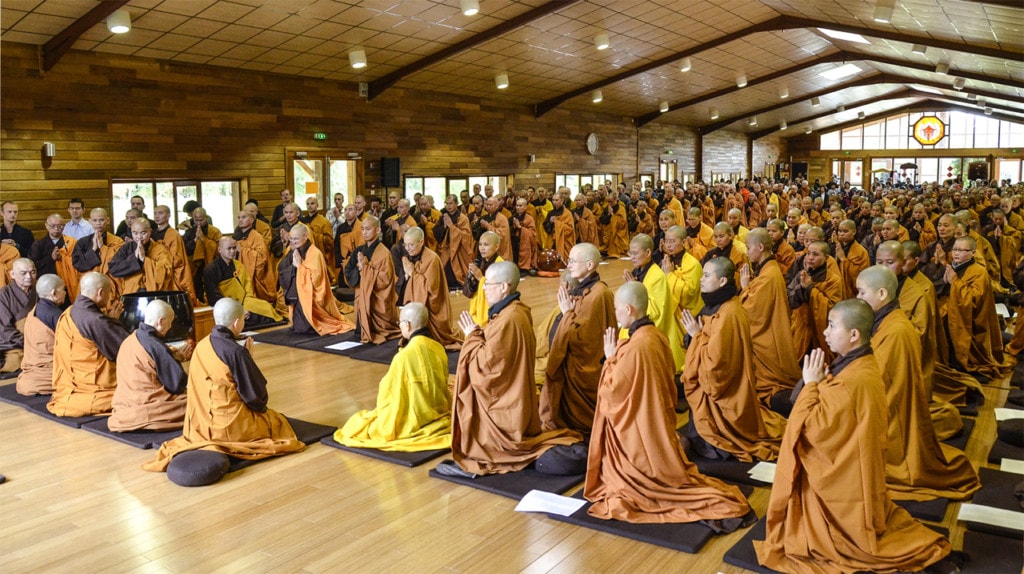
Thich Nhat Hanh is one of the most influential religious leaders of the world in the past century with his principle philosophy teachings of “Engaged Buddhism“. Born in 1926, Thich is a Vietnamese Buddhist Monk who had a huge impact on the Anti-War Movement in the 1960’s and 70’s and continues to speak out against violence in all forms today. Thich advises to promote peace, one must be at peace with oneself. To bridge peace, we must talk to one another with love. And to get off one’s meditation mat and help others. In essence, inaction does not lead to change.
Engaged Buddhism
Inspired by Humanistic Buddhism with roots from China, Thich founded the idea of Engaged Buddhism. Engaged Buddhism refers to Buddhists who are seeking ways to apply insights from meditation practice and dharma teachings to situations of social, political, environmental, and economic suffering and injustice.
During the Vietnam War, he spoke to activists about writing ‘love letters’ to their governments instead of the hateful anti-government rhetoric. As the veterans returned from Vietnam, he helped them adjust back to society. In Vietnam, he founded the School of Youth for Social Service which helped farmers feed their families, rebuild bomb houses and lead education & retreats for children on social change.
“Real change will only happen when
We fall in love with our planet.”
Fourteen Precepts Of Engaged Buddhism
by Thich Nhat Hanh
1. Do not be idolatrous about or bound to any doctrine, theory, or ideology, even Buddhist ones. All systems of thought are guiding means; they are not absolute truth.
2. Do not think that the knowledge you presently possess is changeless, absolute truth. Avoid being narrow-minded and bound to present views. Learn and practice non-attachment from views in order to be open to receive others’ viewpoints. Truth is found in life and not merely in conceptual knowledge. Be ready to learn throughout our entire life and to observe reality in yourself and in the world at all times.
3. Do not force others, including children, by any means whatsoever, to adopt your views, whether by authority, threat, money, propaganda, or even education. However, through compassionate dialogue, help others renounce fanaticism and narrowness.
4. Do not avoid contact with suffering or close your eyes before suffering. Do not lose awareness of the existence of suffering in the life of the world. Find ways to be with those who are suffering by all means, including personal contact and visits, images, sound. By such means, awaken yourself and others to the reality of suffering in the world.
5. Do not accumulate wealth while millions are hungry. Do not take as the aim of your life fame, profit, wealth, or sensual pleasure. Live simply and share time, energy, and material resources with those who are in need.
6. Do not maintain anger or hatred. As soon as anger and hatred arise, practice the meditation on compassion in order to deeply understand the persons who have caused anger and hatred. Learn to look at other beings with the eyes of compassion.
7. Do not lose yourself in dispersion and in your surroundings. Learn to practice breathing in order to regain composure of body and mind, to practice mindfulness, and to develop concentration and understanding.
8. Do not utter words that can create discord and cause the community to break. Make every effort to reconcile and resolve all conflicts, however small.
9. Do not say untruthful things for the sake of personal interest of to impress people. Do not utter words that cause diversion and hatred. Do not spread news that you do not know to be certain. Do not criticize or condemn things you are not sure of. Always speak truthfully and constructively. Have the courage to speak out about situations of injustice, even when doing so may threaten your own safety.
10. Do not use the Buddhist community for personal gain or profit, or transform your community into a political party. A religious community should, however, take a clear stand against oppression and injustice, and should strive to change the situation without engaging in partisan conflicts.
11. Do not live with a vocation that is harmful to humans and nature. Do not invest in companies that deprive others of their chance to life. Select a vocation which helps realize your ideal compassion.
12. Do not kill. Do not let others kill. Find whatever means possible to protect life and to prevent war.
13. Possess nothing that should belong to others. Respect the property of others but prevent others from enriching themselves from human suffering or the suffering of other beings.
14. Do not mistreat your body. Learn to handle it with respect. Do not look on your body as only an instrument. Preserve vital energies (sexual, breath, spirit) for the realization of the Way. Sexual expression should not happen without love and commitment. In sexual relationships, be aware of future suffering that may be caused. To preserve the happiness of others, respect the rights and commitments of others. Be fully aware of the responsibility of bringing new lives into the world. Meditate on the world into which you are bringing new beings.
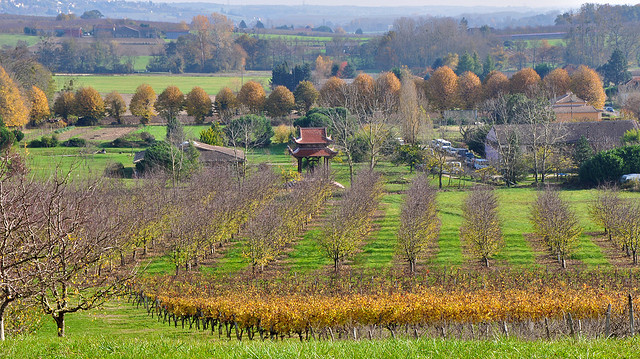
Plum Village in Southern France
Thich established a Mindfulness Practice Center in Dordogne, southern France (near Bordeaux) in 1982 named Plum Village. Today, it is the largest Buddhist Monastery in all of Europe with over 200 resident monks and nuns who reside there. Visitors and spiritual seekers can visit for the day or stay for retreats.
“At a recent retreat at Plum Village, his monastery in France, he spoke with young Israelis and Palestinians about how they can help to stop the cycle of hatred and retribution by looking deeply and addressing the anger within.”
-Kerry Stewart as quoted in her article The Extraordinary Life of Thich Nhat Hanh.

